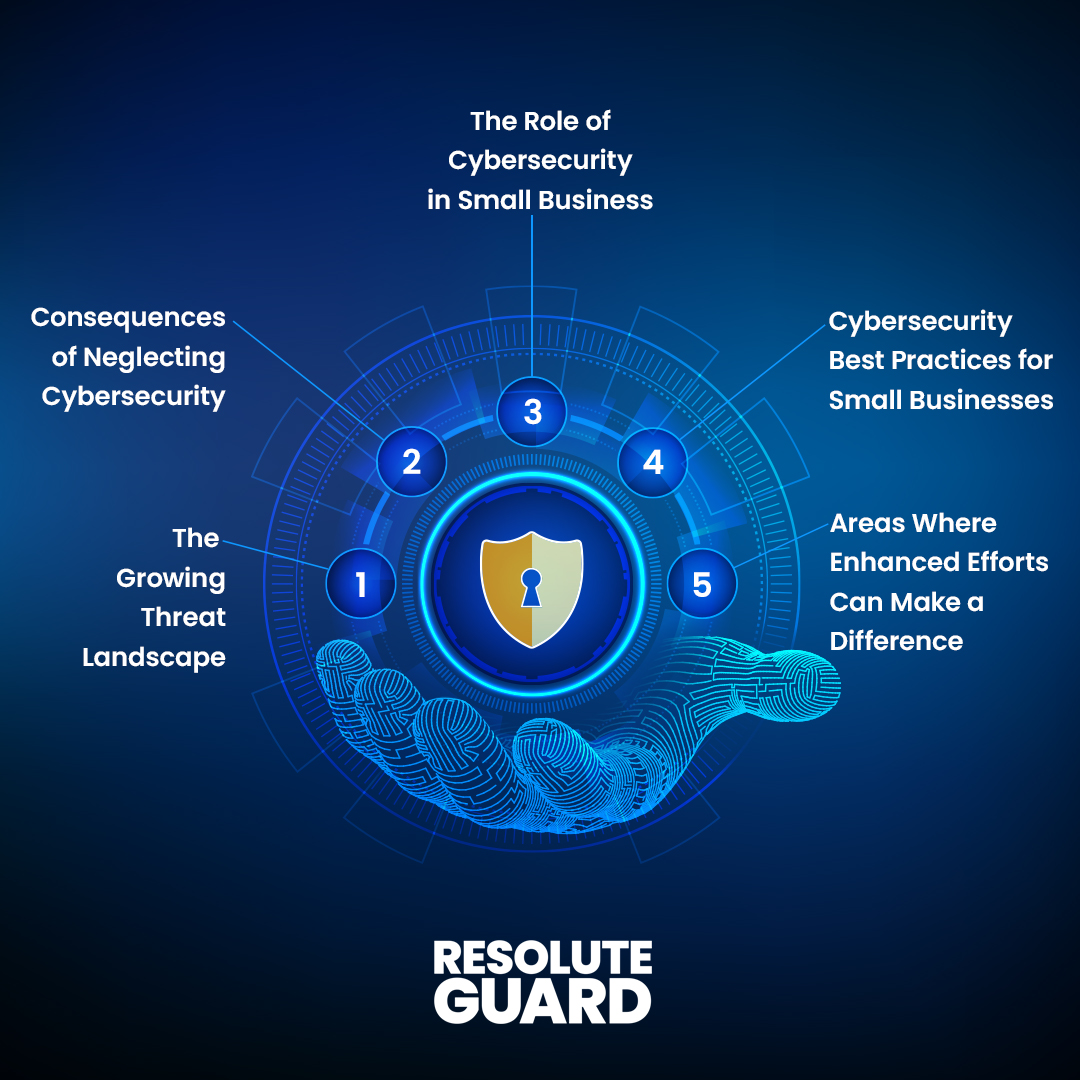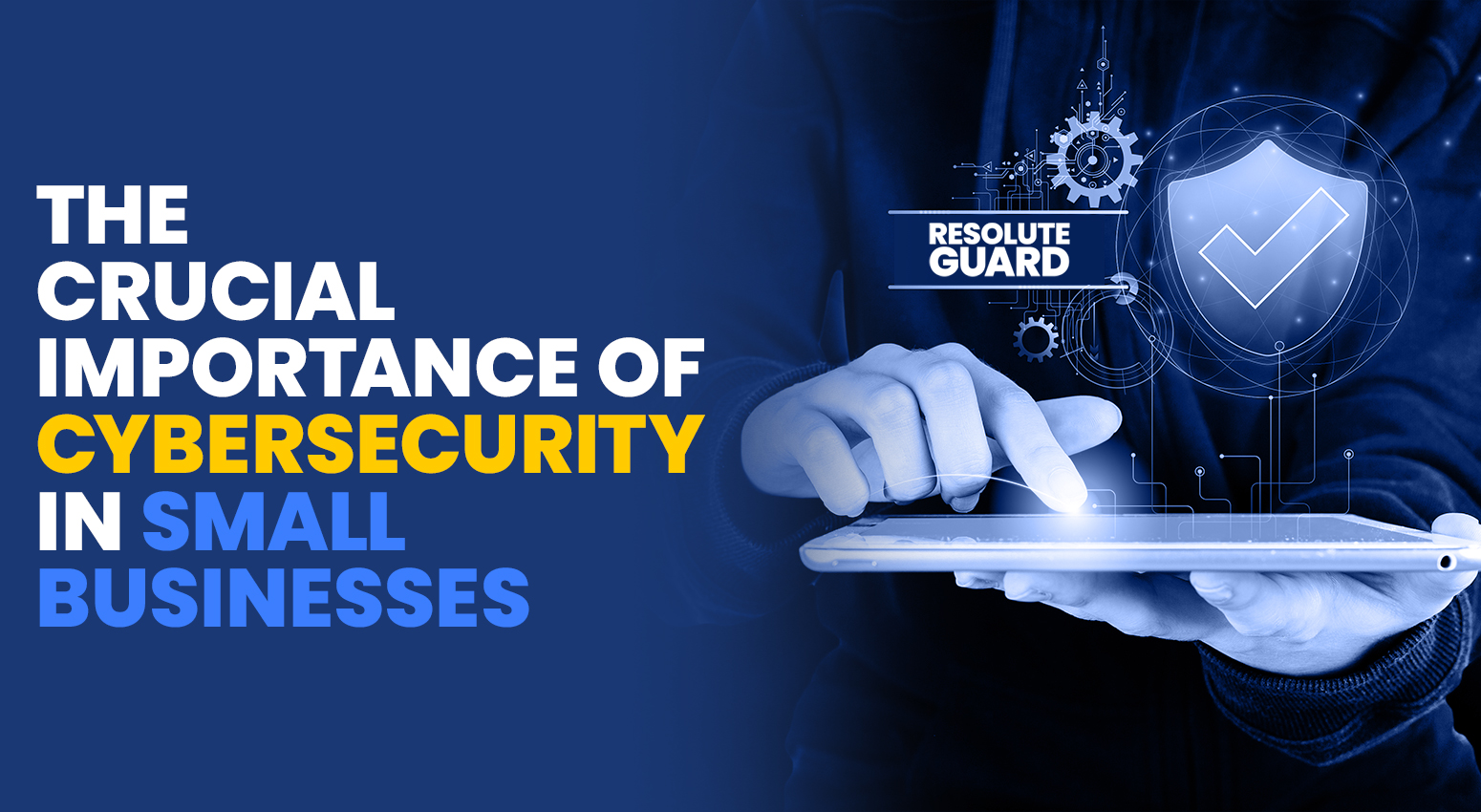The Crucial Importance of Cybersecurity in Small Businesses
In today’s digital age, small businesses are increasingly reliant on technology and the internet to operate efficiently and effectively. While technology provides countless opportunities for growth and success, it also exposes businesses to a multitude of cyber threats. Cybersecurity has become a paramount concern for organizations of all sizes, with small businesses being particularly vulnerable due to their limited resources and often underestimating the risks. This article delves into the critical importance of cybersecurity in small businesses, highlighting the potential consequences of neglecting it and offering actionable advice for fortifying digital defenses.

The Growing Threat Landscape
Small businesses might assume that cyberattacks only target large corporations, but this is far from the truth. In fact, small businesses have become prime targets for cybercriminals for several reasons:
- Weaker Defenses: Smaller budgets often mean fewer resources allocated to cybersecurity measures, making these businesses more susceptible to breaches.
- Valuable Data: Small businesses store sensitive customer and financial data that can be monetized on the dark web, making them attractive targets.
- Low Awareness: Many small business owners underestimate the risks or believe they are too insignificant to attract hackers’ attention, leading to complacency.
- Supply Chain Attacks: Small businesses are often part of larger supply chains, and compromising one small business can provide attackers with access to larger entities.
Consequences of Neglecting Cybersecurity
Failure to prioritize cybersecurity can lead to severe consequences for small businesses, including:
- Financial Loss: Cyberattacks can result in financial losses due to theft, fraud, and downtime. According to the 2021 Verizon Data Breach Investigations Report, the average cost of a data breach for small businesses is around $3.86 million.
- Reputation Damage: A cybersecurity breach can damage a small business’s reputation, eroding customer trust and loyalty. Negative publicity can deter potential customers and partners.
- Legal Ramifications: Non-compliance with data protection regulations such as the General Data Protection Regulation (GDPR) or the California Consumer Privacy Act (CCPA) can result in hefty fines.
- Operational Disruption: Cyberattacks, such as ransomware or Distributed Denial of Service (DDoS) attacks, can disrupt business operations, causing downtime and affecting revenue.
- Intellectual Property Theft: Small businesses often rely on intellectual property (IP) for competitiveness. A breach could lead to the theft of valuable IP, compromising the company’s future.
- Data Breach Fallout: Breached customer data can lead to identity theft, fraud, and legal issues, which can have long-lasting consequences for both the business and affected individuals.
- Recovery Costs: Recovering from a cyberattack can be a costly and time-consuming process, diverting resources away from core business activities.
The Role of Cybersecurity in Small Business
To protect against the aforementioned consequences, small businesses must recognize the pivotal role of cybersecurity in their operations. Here’s why it’s crucial:
- Safeguarding Data: Cybersecurity measures ensure the confidentiality, integrity, and availability of data. Protecting customer information and business data is a fundamental responsibility.
- Regulatory Compliance: Many industries have specific data protection regulations. Adhering to these laws is not only legally required but also demonstrates commitment to ethical business practices.
- Reputation Management: A strong cybersecurity posture helps maintain a positive reputation. Customers are more likely to trust businesses that take their data security seriously.
- Business Continuity: Effective cybersecurity measures ensure business operations can continue even in the face of cyber threats, minimizing downtime and financial losses.
- Competitive Advantage: Small businesses that prioritize cybersecurity can gain a competitive edge, as partners and customers seek reliable and secure partners.
- Mitigating Supply Chain Risks: By securing their own systems, small businesses can help protect their partners and clients from potential breaches stemming from their network.
- Future-Proofing: As technology continues to evolve, investing in cybersecurity today ensures that small businesses can adapt to emerging threats.
Cybersecurity Best Practices for Small Businesses
To enhance cybersecurity in small businesses, consider implementing the following best practices:
- Create a prioritized Cyber Action Plan and include C-Suite and technical resources.
- Employee Training: Train employees to recognize and respond to cyber threats. Conduct simulated Email phishing campaigns, regular training workshops and provide resources to keep your employees informed.
- Strong Password Policies: Enforce strong password practices, including regular password changes, unique passwords, and the use of multi-factor authentication (MFA).
- Regular Updates and Patch Management: Keep software, operating systems, and security solutions up to date to patch known vulnerabilities.
- Network Security: Use firewalls, intrusion detection systems, and encryption to protect your network.
- Data Backup and Recovery: Regularly back up critical data and test restoration procedures to ensure business continuity in case of a ransomware attack or data breach.
- Vendor Security Assessment: Assess the security practices of third-party vendors and partners to minimize supply chain risks.
- Incident Response Plan: Develop an incident response plan to outline actions to take in case of a breach, minimizing damage and downtime. Regularly Test your Plan!
- Create Policies and Procedures such as an Information Security Policy and other important documentation.
- Regular Security Audits: Conduct comprehensive, periodic vulnerability scans (Internal Network and External) security audits to identify weaknesses and areas for improvement. Don’t rely on Penetration or website scans only.
- Employee Access Control: Limit access to sensitive data and systems only to authorized personnel on a need-to-know basis.
- Cybersecurity Insurance: Consider purchasing cybersecurity insurance to mitigate financial risks associated with cyberattacks.
Areas Where Enhanced Efforts Can Make a Difference
- Regular Security Assessments: Small businesses should conduct regular security assessments, which can include comprehensive vulnerability scans, penetration testing, and risk assessments. These assessments help identify weaknesses and prioritize security improvements.
- Email Security: Email remains a common attack vector. Implement robust email security measures to detect and block phishing attempts, malware-laden attachments, and suspicious links. Employee training can also help in recognizing phishing attempts.
- Endpoint Protection: Consider endpoint protection solutions that include antivirus, anti-malware, and endpoint detection and response (EDR) capabilities. These tools can help detect and respond to threats targeting individual devices within the network.
- Secure Remote Work: With the rise of remote work, small businesses should ensure that remote employees follow secure practices, such as using virtual private networks (VPNs) and secure communication tools.
- Incident Response Plan: It’s not IF, but WHEN an incident will occur. An incident response plan is crucial for efficiently handling cybersecurity incidents. It should outline steps to take when a breach occurs, including communication protocols, reporting procedures, and coordination with law enforcement if necessary.
- Data Encryption: Encrypt sensitive data both at rest and in transit. Encryption adds an extra layer of protection to prevent unauthorized access to sensitive information.
- Security Awareness Training: Employees are often the weakest link in cybersecurity. Regularly train them on security best practices, the latest threats, and how to respond in case of an incident.
- Regular Updates and Patch Management: Cybercriminals exploit known vulnerabilities in outdated software. Regularly update all software and apply patches promptly to mitigate these risks.
- Access Control: Implement strong access control policies to ensure that employees have access only to the resources necessary for their roles. Regularly review and update access permissions as needed.
- Backup and Disaster Recovery: In addition to regular backups, create a comprehensive disaster recovery plan to ensure data restoration and business continuity in the event of a catastrophic cyber incident. Set goals to restore within 24-48 hours.
- Collaboration with Cybersecurity Professionals: Small businesses will benefit from collaborating with cybersecurity professionals or Managed Security Service Providers (MSSPs) to monitor and manage their security infrastructure effectively.
- Cybersecurity Culture: Foster a culture of cybersecurity awareness within the organization. Encourage employees to report suspicious activities promptly, and reward those who contribute to improving security.
In the digital age, the importance of cybersecurity for small businesses cannot be overstated. Cyber threats continue to evolve and grow in sophistication, making it imperative for small businesses to adapt and fortify their defenses. While the initial investment in cybersecurity measures may seem daunting, the potential costs of a cyberattack far outweigh the proactive steps taken to prevent them.
Small business owners must understand that cybersecurity is not a one-time effort but an ongoing commitment. By implementing best practices, regularly assessing and adapting security measures, and cultivating a cybersecurity-conscious culture within the organization, small businesses can significantly reduce their exposure to cyber threats and ensure their continued success in an increasingly interconnected and digital world. Ultimately, the investment in cybersecurity is an investment in the long-term viability and reputation of the business.
Case Study 1: The Local Retailer’s Data Breach
Background: A small, family-owned retail store specializing in electronics had been operating successfully for years without any significant cybersecurity measures in place. They believed their small size and relatively low profile would keep them off the radar of cybercriminals.
Incident: In a targeted attack, cybercriminals managed to breach the retailer’s point-of-sale (POS) system, gaining access to customer payment card information. The breach went undetected for several months, during which time the criminals exploited the stolen data for fraudulent transactions.
Consequences:
- Financial Loss: The retailer suffered significant financial losses due to fraudulent transactions and chargebacks, totaling over $250,000.
- Reputation Damage: Word of the data breach spread quickly, and customers lost trust in the retailer’s ability to protect their data, resulting in a decline in sales.
- Legal Issues: The retailer faced potential lawsuits and fines for failing to protect customer data in compliance with payment card industry (PCI) standards.
- Operational Disruption: The breach disrupted business operations as the retailer had to investigate the incident, notify affected customers, and upgrade their security measures.
Lesson Learned: Small retailers, no matter their size, can be attractive targets for cybercriminals due to the valuable payment card information they handle. Implementing robust cybersecurity measures, including regular security assessments and PCI compliance, is essential for safeguarding customer data and maintaining trust.
Case Study 2: The Boutique Marketing Agency Ransomware Attack
Background: A boutique marketing agency, serving a niche market, had limited IT resources and underestimated the risk of cyberattacks. They primarily relied on cloud-based tools and had never conducted a comprehensive cybersecurity audit.
Incident: The agency fell victim to a ransomware attack that encrypted all their client data and marketing campaigns. The attackers demanded a substantial ransom for the decryption key.
Consequences:
- Financial Loss: The agency had to pay a hefty ransom to regain access to their data, resulting in significant financial losses.
- Reputation Damage: Clients were deeply concerned about the agency’s inability to protect their data and marketing materials, leading to the loss of several major clients.
- Operational Disruption: The agency experienced significant downtime while recovering from the attack, affecting ongoing campaigns and project timelines.
- Client Legal Issues: Some clients explored legal action against the agency, citing negligence in data protection.
Lesson Learned: Small marketing agencies, like any other business, are vulnerable to ransomware attacks. Regularly backing up data and having a well-defined incident response plan in place could have minimized the impact of this incident.
Case Study 3: The Startup’s Intellectual Property Theft
Background: A tech startup developing innovative software solutions had secured substantial funding but had not invested in cybersecurity beyond basic antivirus software.
Incident: A competitor, aware of the startup’s valuable intellectual property, successfully executed a cyberattack to steal their source code and proprietary algorithms.
Consequences:
- Intellectual Property Loss: The startup’s most valuable assets were stolen, giving their competitor an unfair advantage in the market.
- Financial Implications: The startup had to spend significant resources on legal actions to protect their IP and regain their competitive position.
- Loss of Investor Confidence: Investors grew wary of the startup’s ability to safeguard their investments, which hindered future funding opportunities.
- Stalled Growth: The time and resources spent on recovering from the attack delayed product development and market expansion plans.
Lesson Learned: Intellectual property theft can be detrimental to small startups. Implementing robust cybersecurity measures and protecting proprietary information is crucial for maintaining competitiveness and investor confidence.
Case Study 4: The Family-Owned Restaurant’s Data Breach
Background: A small, popular family-owned restaurant that had been in business for decades decided to modernize by introducing online reservations and payment systems. However, they overlooked cybersecurity measures, believing that their industry was immune to cyber threats.
Incident: Cybercriminals exploited a vulnerability in the restaurant’s online reservation system, gaining access to customer names, contact information, and credit card details. The breach went unnoticed for several weeks.
Consequences:
- Financial Impact: The restaurant incurred substantial financial losses due to fraudulent transactions, chargebacks, and penalties imposed by payment processors.
- Reputation Damage: Customers lost trust in the restaurant’s ability to protect their personal and financial information, resulting in a decline in reservations and walk-in customers.
- Legal Complications: The restaurant faced potential lawsuits and regulatory fines for failing to secure customer data properly.
- Operational Disruption: The breach disrupted daily operations as the restaurant had to notify affected customers, conduct an investigation, and upgrade their security systems.
Lesson Learned: Small businesses in the hospitality industry are attractive targets for cybercriminals due to the valuable customer data they handle. Implementing cybersecurity measures, such as regular security assessments and compliance with payment card industry (PCI) standards, is essential to protect customer information.
Case Study 5: The Artisanal E-commerce Store’s Phishing Attack
Background: An artisanal e-commerce store, known for its handcrafted goods, had a loyal customer base but had never invested in cybersecurity. They believed their small, niche market made them an unlikely target.
Incident: Cybercriminals launched a sophisticated phishing campaign, sending convincing emails to customers, impersonating the store. Many customers unknowingly provided their login credentials and credit card information to the attackers.
Consequences:
- Financial Loss: The e-commerce store suffered financial losses due to fraudulent transactions, refunds, and customer compensation.
- Reputation Damage: Customers lost faith in the store’s security measures, resulting in a decline in sales and negative online reviews.
- Operational Disruption: The incident disrupted business operations as the store had to investigate the breach, notify affected customers, and implement improved security measures.
- Legal Implications: The store faced potential legal consequences for the data breach and failure to protect customer information.
Lesson Learned: Small e-commerce businesses, regardless of their size, are vulnerable to phishing attacks. Implementing email security measures, educating customers about recognizing phishing attempts, and strengthening authentication procedures can help mitigate risks.
Case Study 6: The Neighborhood Pharmacy’s Ransomware Attack
Background: A neighborhood pharmacy, serving a small community, believed they were too insignificant to attract cybercriminals’ attention. They lacked comprehensive cybersecurity measures and had not conducted cybersecurity training for employees.
Incident: The pharmacy fell victim to a ransomware attack that encrypted patient records, prescription information, and inventory data. The attackers demanded a substantial ransom to provide the decryption key.
Consequences:
- Financial Loss: The pharmacy had to pay the ransom to recover their data, resulting in significant financial losses.
- Operational Disruption: The attack caused significant downtime as the pharmacy had to restore data, impacting prescription filling and patient care.
- Reputation Damage: Patients were concerned about the safety of their personal and medical information, potentially leading to a decline in customer trust and patronage.
- Legal Obligations: The pharmacy faced potential legal and regulatory consequences for failing to protect patient data as required by healthcare regulations.
Lesson Learned: Healthcare providers, regardless of their size, must prioritize cybersecurity to protect sensitive patient information. Implementing robust cybersecurity measures, including employee training and secure backup solutions, is crucial for data protection.
These case studies emphasize that cybersecurity is a critical concern for small businesses across various industries. It underscores the importance of proactive measures, employee education, and robust security protocols to safeguard sensitive data, reputation, and financial stability.

